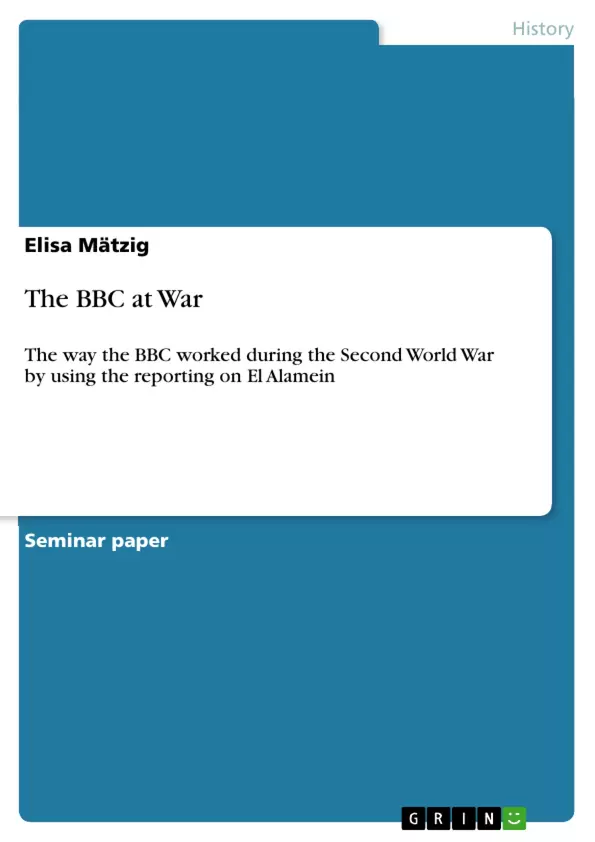The Second World War was the first total war: because of the Blitz, the massive bombardment of British cities by the German air force, British were as much involved in the battle zone as the troops were, and so, of course, was the BBC. It was also the first ideological war, a conflict of words in which radio played a more important role than did the medium of print. And besides these challenges the BBC had broadcasting duties which would be normal in any war: to provide an extensive and credible news service and to raise and maintain national morale with a varied programme of entertainment.
At midnight on 4 November 1942 the British people finally heard good news about the course of the war with Germany. The BBC was able to announce that the British Army had achieved a decisive victory over the Italian and German Panzerarmee west of the railway half of El Alamein in Egypt. The tattered remnants of Rommel’s once proud Africa Korps were in full retreat.
In the following term paper, I will examine the way the BBC worked during the Second World War by using the reporting on El Alamein as a representative example. First of all it will be examined how the BBC developed and worked during the time between 1939 and 1945, including the different types of offered programmes but also the way the staff worked under the adverse circumstances of war. Then the battle of El
Alamein will be explained, although it will not be possible to go too much into detail.
After these explanatory chapters the practical analysis of War Reports of the battle of El Alamein follows. It was not easy to collect these examples because there is only a limited number of old recordings available on the internet. Even though I contacted the BBC archive, they could not help me. So I had to rely on the sources provided on the
internet. My original plan was to compare the Germans reports with the BBC ones. However, there were no German audio clips available even though I got in contact with many archives.
Inhaltsverzeichnis (Table of Contents)
- INTRODUCTION
- THE BBC AT WAR
- BRITAIN AT WAR - THE BATTLE OF EL ALAMEIN
- THE BBC REPORTING ON THE BATTLE OF EL ALAMEIN
- HOW THE CORRESPONDENTS REACHED THE BATTLE ZONE
- THE REPORTS ON EL ALAMEIN
- CONCLUSION
Zielsetzung und Themenschwerpunkte (Objectives and Key Themes)
This term paper examines the role of the BBC during World War II, focusing on the reporting of the Battle of El Alamein as a representative example. It analyzes the BBC's development and operation during the war, including its programming, staff challenges, and reporting strategies. Additionally, it explores the context of the Battle of El Alamein and its significance in the war effort. The paper then presents a practical analysis of BBC war reports on the battle, exploring the unique challenges of reporting from the front lines and the impact of the BBC's coverage on public morale.
- The BBC's role in wartime broadcasting
- The impact of the Battle of El Alamein on the war
- The challenges of war reporting
- The BBC's impact on public morale
- The relationship between the BBC and the British government
Zusammenfassung der Kapitel (Chapter Summaries)
- Introduction: The introduction sets the stage for the term paper by outlining the unique challenges of the BBC during World War II, highlighting its significance as a primary source of news and a vital tool for maintaining public morale. It also introduces the Battle of El Alamein as a focal point of the paper, emphasizing its significance as a turning point in the war.
- The BBC at War: This chapter explores the BBC's evolution and operation during the war. It examines the different types of programming offered, the challenges faced by BBC staff under wartime conditions, and the corporation's relationship with the British government.
- Britain at War - The Battle of El Alamein: This chapter provides a historical overview of the Battle of El Alamein, its significance in the war, and its impact on the British public. It avoids detailed descriptions of the battle itself to avoid spoilers for readers.
- The BBC Reporting on the Battle of El Alamein: This chapter delves into the practical aspects of war reporting during the Battle of El Alamein. It explores how BBC correspondents reached the battle zone, the challenges they faced, and the specific content of their reports. It also analyzes the impact of these reports on public opinion and morale.
Schlüsselwörter (Keywords)
This paper focuses on the BBC's role in wartime broadcasting, exploring its operation, programming, and impact on public morale. Key themes include the unique challenges of war reporting, the Battle of El Alamein, and the relationship between the BBC and the British government. This analysis emphasizes the importance of radio technology in delivering news and shaping public opinion during a period of global conflict.
Frequently Asked Questions
What role did the BBC play during World War II?
The BBC served as a credible news service and a vital tool for maintaining national morale through information and entertainment.
Why was the Battle of El Alamein significant for the BBC?
It allowed the BBC to announce the first major British victory against German forces, significantly boosting public morale in November 1942.
How did war correspondents report from the battle zones?
Correspondents faced immense dangers reaching the front lines to provide eye-witness accounts, which were then broadcast as "War Reports."
What challenges did BBC staff face during the war?
Staff worked under adverse conditions, including the Blitz, and had to balance journalistic credibility with government censorship and propaganda needs.
Was radio more important than print during WWII?
Yes, the report describes WWII as a "conflict of words" where radio played a more immediate and influential role than print media.
- Citation du texte
- Elisa Mätzig (Auteur), 2009, The BBC at War, Munich, GRIN Verlag, https://www.grin.com/document/154281



